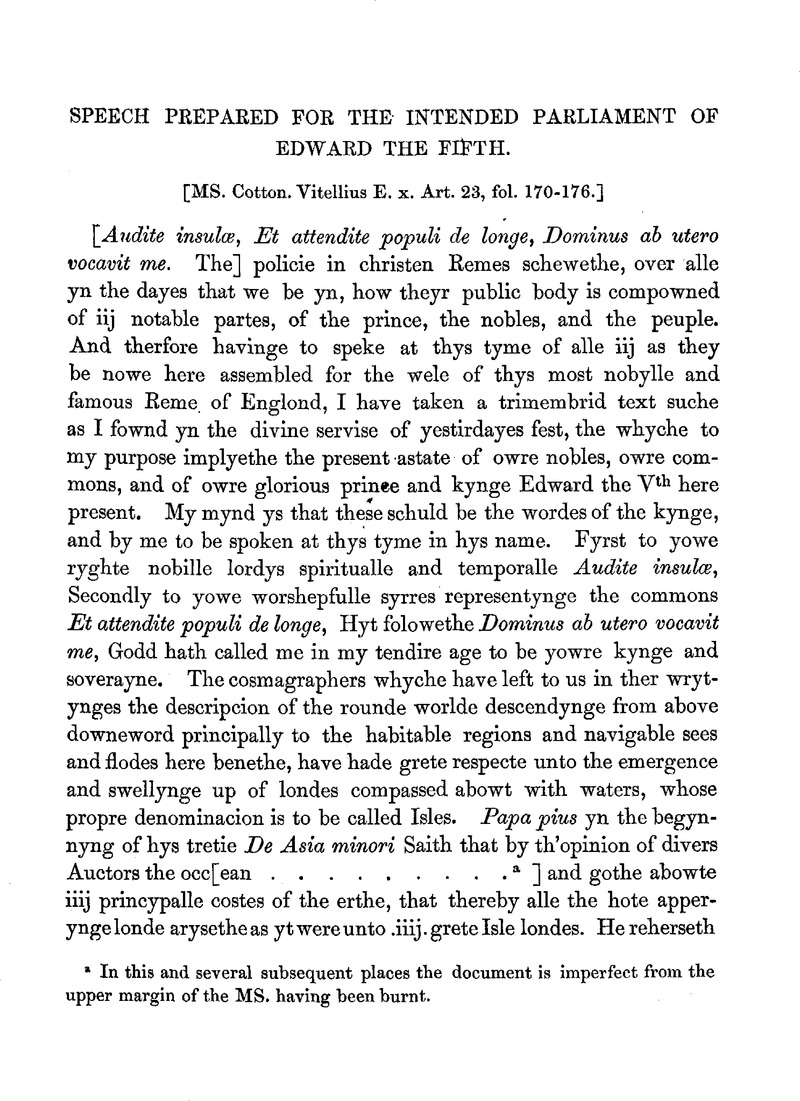No CrossRef data available.
Published online by Cambridge University Press: 25 March 2010

page xxxix note * In this and several subsequent places the document is imperfect from the upper margin of the MS. having been burnt.
page xl note a Whether the bishop here intended a reflection upon the “great Iiyvers” to whom the duke of Gloucester was mortallj opposed, I leave to the determination of the reader : but I think it highly probable that lie intended to lay a particular stress upon these words, so that they should readily catch the ears of his audience, and bear a covert meaning somewhat more intelligible to the majority of his hearers than the rest of his discourse.
page xl note b This word is misprinted “merth” in Mr. Sharon Turner's extracts from the Speech.
page xl note c Mr. Sharon Turner has misprinted this passage thus: “the ferme ground that men see in the land. Then the common people, &c.
page xl note d Revel, xvii. 15.
page xl note e Burnt away.
page xli note a In my opinion, another reflection intended to tell against the unfortunate relatives of the Queen. I may remark that the word is always written in the manuscript with a capital initial, and so is Richesse, which may have been intended to point to the name of the Protector. It should be mentioned, however, that words beginning with that letter have frequently a capital given them by the writer. In this respect the MS. is strictly followed.
page xli note b This whimsical conjecture regarding the Isle of Wight, which the bishop inserts by way of parenthesis, had also probably some covert allusion beyond mere etymological speculation. Among the titles of earl Ryvers was that of lord of the Isle of Wight.
page xlii note a Psalm,
page xlii note b MS. the.
page xlii note c MS. on to.
page xlii note d Isaiah, xxx. 10.
page xliii note a Isaiah, i. 2.
page xliii note b MS. ther
page xlv note a MS. the.
page xlvii note a 1 Cor. xii. 26.
page xlvii note b of in MS.
page xlvii note c Mr. Sharon Turner has printed this word “seson,” which may be the correct reading, though not so in the MS. The word “fortunes” has a stroke more, “fortumes :” and had possibly some other meaning. In the preceding line Mr. Turner read the imperfect word “prudence.”
page xlviii note a Mr. Sharon Turner remarks upon this passage, “This would seem to imply that there was some picture or statue of the late king near the throne :” but the writer is evidently referring only to the young king's position,—more truly indeed than he imagined at the time, as creating a brief interregnum between the administration of his father and that of his uncle.
page xlviii note b Here, unfortunately, we again arrive at the burnt edge of the manuscript, so that the first encomium paid to the royal brothers is lost. The word “marcialle,” however, remains. Mr. Sharon Turner misread it “majorall,” and transferred the whole to the Protector, reading on, without regarding the lost portion,— “to be hys tutor and protector, to take example of majoralle kunnyng,” &c. Miss Halsted (Life of Richard III. vol. ii. p. 44) has, of course, amplified and perverted all this still further, quoting it as a testimony to Richard's “unblemished character up to this unlooked-for exaltation.”
page xlix note a This word was perhaps not “princes.” It is imperfect.
page xlix note b In the MS. this word is left imperfect—“ we.” Mr. Sharon Turner has converted it into “use ;” but it was doubtless meant for “wele,” which occurs so frequently throughout the composition.
page xlix note c & in MS.
page xlix note d at in MS.
page xlix note e Psalm xxii. 9.
page l note a good in MS. but see p. lviii.
page li note a Curators?
page li note b MS. kynge, butsee p. lix.
page li note c MS. beste.
page li note d 1 Cor. xii. 25.
page lii note a These reflections are evidently levelled against the late duke of Buckingham.
page lii note b This word was left blank by the writer.
page lii note c MS. my.
page lii note d In MS. treax.
page lii note e In MS. aīmall' causes.
page liii note a Louis XI.
page liii note b In MS. yt.
page liii note c MS. towchynge.
page liv note a The scribe has in this passage evidently miscopied some of the bishop's expressions, and it is difficult to guess what they were.
page liv note b This is an allusion to the Speech which had been addressed to the preceding parliament, which met on the 20th Jan. 1482–3, when archbishop Rotherham, then chancellor, “causas summonitionis parliament prjedicti notabiliter pronunciavit et declaravit, assumens pro suo themate, Dominus illuminatio mea, et salus mea,” &c. (Rot. Parl. vi. 196.)
page lv note a Psalm xiii. 3.
page lv note b In MS. ye.
page lvi note a Sic MS.
page lviii note a MS. mistys, but see p. li.
page lviii note b 1 Cor. xii. 25.
page lviii note c MS. consuetus.
page lix note a See p. li.
page lx note a The passage that follows is taken from the writer's former Speech. See p. xlvi.
page lxi note a The duke of Buckingham, as before in p. lii.
page lxi note b muste in MS.
page lxi note c Leviticus, xix. 14.
page lxii note a Romans, xi. 33.
page lxii note b MS. as.
page lxii note c 1 Cor. xiii. 12.
page lxii note d In MS. cesare.
page lxii note e Matt. xxii. 21.
page lxii note f Col. iii. 22.
page lxii note g Whe in MS.
page lxiii note a Leo in MS.